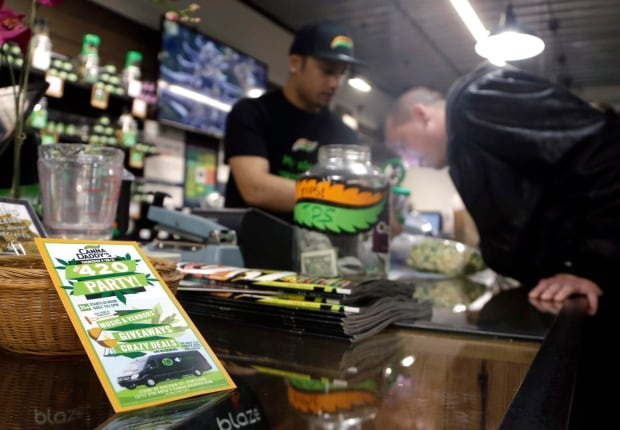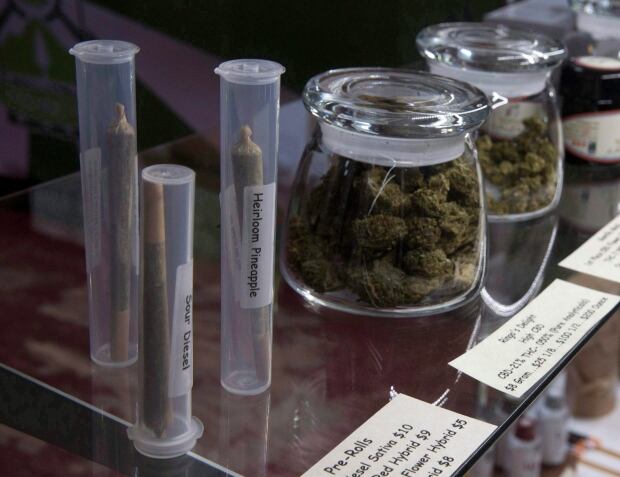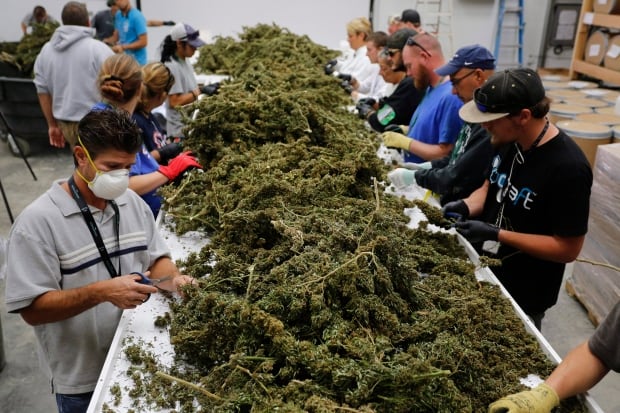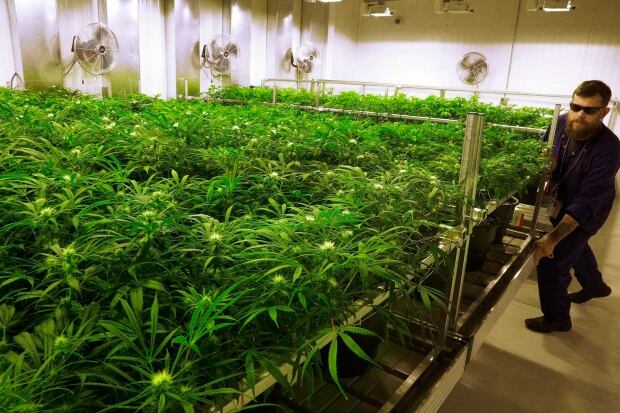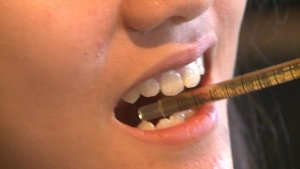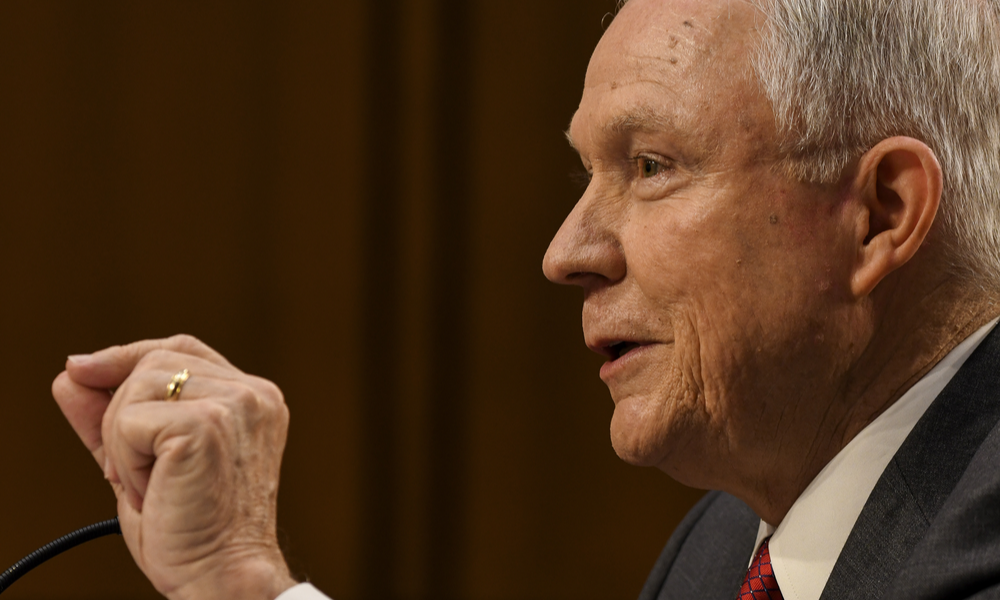Passage of the Rohrabacher-Blumenauer amendment in the budget is absolutely vital and critical. Let your representatives know your views on this, I did and received a reply (form letter, I'm sure) from one of my Senators that he fully supports passing this amendment. Its the only thing keep Sessions and Sabet out of our knickers.
How Jeff Sessions Plans to End Medical Marijuana Before the Year Is Over
By
Melina Delkic On 11/24/17 at 7:50 AM
Tears streamed down Claudia Jendron's face this year as her doctor patted her hand and told her, after eight years of failed pain treatments for her spinal fusion-gone-wrong, "This is going to work, Claudia." She was talking about medical marijuana.
For “eight years of hell,” Jendron tried opioids, epidural shots and acupuncture in the hopes that she’d be able to sit down or go to her grandchildren’s birthday parties without having to leave and lie down. None of it worked. At one point, she considered checking into an assisted living facility to receive morphine before she tried medical marijuana.
Then, early this year, the 66-year-old upstate New Yorker got a prescription for medical marijuana to help what she called “excruciating pain." To Jendron’s surprise, her doctor was right about the weed. Two days after starting a tincture (a liquid cannabis extract dropped under the tongue), her crushing pain subsided to something manageable.
Keep up with this story and more by subscribing now
“I can lean over and hug my grandkids without screaming anymore,” she said. “I went to a commitment ceremony in the park the other day, and I lasted all day long without any pain...It’s just, it’s amazing.”
New York is one of 29 states (plus the District of Columbia) that have legalized medical marijuana––a trend that 94 percent of Americans support, according to
an August Quinnipiac poll. But on December 8, all of that could begin to change.
Congress has until that day to decide whether to include the Rohrabacher-Farr Act (also known as Rohrabacher-Blumenauer) in a bill that will fund the government through the next fiscal year. Right now, that law, made up of just 85 words, blocks the Department of Justice from using any money to prosecute medical marijuana in states where it's legal.
The text of the Rohrabacher-Farr (also known as Rohrabacher-Blumenauer) Act, which blocked the U.S. Department of Justice from spending any money to prosecute medical marijuana in states where it's legal. H.R. 2029 - Consolidated Appropriations Act, 2016
In May, Attorney General Jeff Sessions pushed back against the bill when he sent a strongly worded letter to Democratic and Republican leaders in Congress, asking them to oppose protections for legal weed and allow him to prosecute medical marijuana.
“I believe it would be unwise for Congress to restrict the discretion of the Department to fund particular prosecutions, particularly in the midst of an historic drug epidemic and potentially long-term uptick in violent crime," Sessions wrote in his letter.
The bill's 2014 passage, with 170 Democrats and 49 Republicans in favor, was the first time Congress passed legislation that protected medical marijuana users and businesses. It meant that an attorney general could no longer send Drug Enforcement Administration agents (or use other government resources) to bust medical marijuana in states where it was legal.
It was in line with the Obama administration's 2013 "
Cole Memo," in which Deputy Attorney General James Cole said the Justice Department would refrain from prosecuting medical marijuana businesses and users in states where it was legal, and that it would prioritize more serious marijuana offenses, like drug cartels and sales to minors. The policy marked a change for the Obama administration, where medical marijuana busts were once rampant.
With his letter, Sessions pushed Congress to end these protections. In a
statement on Friday, Sessions announced that the Justice Department would halt the practice of guidance memos, and review Obama administration guidance memos on legal pot to see if they went too far.
Sessions is known for being one of the nation's toughest critics of legal pot. He once said the KKK was "OK until I found out they smoked pot."
More recently, he said at a speech in March in Richmond, "I am astonished to hear people suggest that we can solve our heroin crisis by legalizing marijuana—so people can trade one life-wrecking dependency for another that’s only slightly less awful.”
In the early decades of his career, denouncing marijuana was an unprovocative viewpoint. In the days of DARE and abstinence-only drug education, marijuana was the bogeyman at the gateway to much more dangerous drugs. But despite new research praising medical pot and the skyrocketing approval ratings for the drug, Sessions has only budged ever so slightly in that view.
U.S. Attorney General Jeff Sessions testifies before a House Judiciary Committee hearing on oversight of the Justice Department on Capitol Hill in Washington, U.S., November 14, 2017. REUTERS/Yuri Gripas
He nodded last week and said, "I think that's correct" when Representative Steve Cohen, a Tennessee Democrat, said cannabis was not as dangerous as heroin. Sessions said he'd consider thorough analyses of medical marijuana, but that he was not optimistic.
"He’s old fashioned and very conservative," said Philip Heymann, a Harvard Law School professor and former Justice Department official for the Kennedy, Johnson, Carter and Clinton administrations.. "Literally seven years ago, maybe eight years ago, marijuana was thought to be a very dangerous drug. Why would he focus on this issue? Because he’s seven years out of date."
Even the attorney general who set the precedent for federal prosecution of legalized marijuana says Sessions would be remiss to put many resources, amid all of the country’s larger problems, into prosecuting medical marijuana.
“To prosecute an act that is otherwise lawful under state law, one could make the argument [that] as a matter of policy, we’ve got other priorities we ought to be spending our resources on,” Alberto Gonzales, the attorney general for President George W. Bush, told
Newsweek. “With respect to everything else going on in the U.S., this is pretty low priority.”
In theory, without Rohrabacher-Farr in his way, Sessions could send DEA agents into a medical marijuana dispensary or producer in any state to bust it. Experts say, if he did this, he'd likely prosecute a distributor or a producer with other violations, like tax or licensing mistakes, in addition to its violation of the CSA.
"They can scream all they like that they haven’t violated state laws, but they violated federal law," said Heymann.
Ilya Shapiro, a constitutional studies fellow at conservative think tank CATO institute and the editor of its Supreme Court Review, said law enforcement would likely first prosecute those in gross violation of federal laws before the average pot smoker––"the same way police go after rapists and murderers before they go after jaywalkers."
The Justice Department declined requests for comment on its medical marijuana agenda or on the aftermath of a Rohrabacher-Farr expiration. Representatives Sam Farr (D-Calif.) and Dana Rohrabacher (R-Calif.) introduced and passed the bill in 2014, after years of failed attempts, as part of the Commerce, Justice and Science Appropriations Bill for fiscal year 2015. It has been renewed twice since then, until House Republican leadership blocked a vote on it in September.
Under the bill, none of the funds appropriated by Congress to the D.O.J. can be used “to prevent [states] from implementing their own laws that authorize the use, distribution, possession, or cultivation of medical marijuana." Congress has to vote on it every year.
Nicholas Vita, the CEO of Columbia Care, a medical marijuana healthcare company with dispensaries across the country, said Sessions "clearly has a bias." His company owns five dispensaries in New York –– including the one in Rochester, where Jendron gets her weed. But, Vita said, “The toothpaste can’t be put back in the tube." With such high support across the country, a full reversal seems extremely unlikely.
Inside Columbia Care, a medical marijuana dispensary in Manhattan. Newsweek/Melina Delkic
Columbia Care’s Manhattan dispensary looks more like the lobby of a luxury hotel than a place to get weed, but with much more security. Its marijuana is mostly stored in a thick and ominous-looking steel safe, an extra-cautious precaution to make sure the dispensary complies with DEA standards. It comes in three, carefully measured formats –– capsules, a tincture (liquid cannabis extract) that patients take with a dropper, and a vape pen.
A pharmacist at the Manhattan branch of Columbia Care, a medical marijuana dispensary chain, holds a vape pen. Newsweek/Melina Delkic
Vita said public perception on dispensaries like Columbia’s has changed rapidly.
“Five years ago, no one even talked to us,” Vita said. “I couldn’t even tell my mom and dad what I do for a living.” Today, he says leading research institutions reach out to him to partner on studies.
Despite the turnaround, strong dissenting voices remain.
Kevin Sabet, president of the nonprofit Smart Approaches to Marijuana, an anti-marijuana legalization group led by former Representative Patrick Kennedy (D-RI), said legal weed was not as harmless as the recent hype has made it out to be. "A lot of people are being peddled this by an industry that wants to make money, like any other industry," he said. "I have a really hard time with the very small handful of studies out. They’re just not something that the scientific community agrees upon."
Studies are indeed limited, because marijuana is a Schedule I drug, making it hard to get DEA funding for that research. A
recent study in Colorado found a reversal of opioid deaths following recreational legalization.
Two August studies found, however, that evidence of its efficacy in chronic pain or PTSD treatment was lacking. While far from a consensus, its patients seem hopeful.
For patients like Jendron, the proof is in lived experience.
Chronic pain "manipulates your life," she said. "I'm smiling because I don't hurt anymore."
